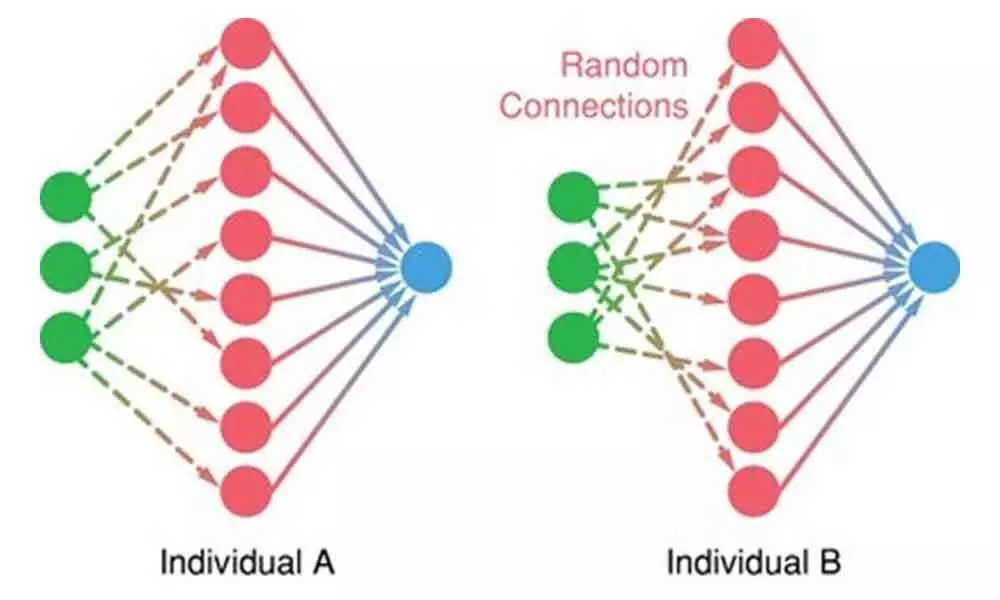Live
- Mahabubnagar: Grandeur marks X’mas festivities
- EPFO adds 13.41L net members as employment rises
- Pope calls for world peace
- Largest Jain museum mirrors Indian value system
- Man sets himself on fire near Parl building
- MLA participates in prayers at North Parish Church
- Involvement Of Canadian Colleges Under Lens: ED probes human trafficking racket
- Water security biggest challenge of 21stC : PM
- 32 survive Kazakhstan air crash
- CM Revanth for CWC meet in Belagavi today
Just In
IIT Kanpur researchers find how brains overcome wiring variability


Our brains control what we perceive. Although the nose receives the molecules diffusing out of a fruit, it is the neurons in the brain that convert the output of the nose into the perception of an 'aromatic' or a 'stinking' smell.
Kanpur: Our brains control what we perceive. Although the nose receives the molecules diffusing out of a fruit, it is the neurons in the brain that convert the output of the nose into the perception of an 'aromatic' or a 'stinking' smell.
Most people find the smell of an orange pleasing and the smell of a rotten fish stinking. This similarity in perceptions are not because the brains are wired identically.
In fact, it would be impossible to get identical brain wiring in different people.
A human brain has about 100 billion neurons and over a 100 trillion connections - such a humongous amount of detail cannot be stuffed into DNA, whose storage capacity is thousands of times smaller.
Only the coarse layout of the brain circuits can be specified genetically, while the exact connections vary from individual to individual. (This is analogous to how the shapes of fingers are quite similar, while the fingerprints vary from individual to individual).
Given the variability in the brain wirings, how do most people manage to perceive the rotten fish as stinking? This riddle has been addressed in research conducted at IIT Kanpur, using computer simulations and experiments on smaller organisms.
In an article published in the journal Nature Communications, the researchers reported the brain mechanisms that overcome the wiring variability.
The research was conducted by a team of scientists including Dr. Nitin Gupta in the department of biological sciences and bioengineering and his PhD student Aarush Mittal.
The researchers made use of the detailed experimental data available for the mushroom body, an area of the insect brain involved in processing smells.
Insect brains are small - smaller than the size of a sand grain - with less than a million neurons.
"But they contain the same types of neurons and connections as found in humans and other animals. So they can be used to understand the common principles of brain functioning," Gupta said. The neurons that provide input to the mushroom body are wired similarly across individuals.
And so their responses to smells are also stereotyped across individuals. But the connections within the mushroom body vary from individual to individual.
Thus, it was expected that the responses of all subsequent neurons would be highly variable. Mittal and Gupta noticed that a previous research study had reported stereotyped responses in the output neurons of the mushroom body in flies.
"To confirm that this was not an anomaly or something limited to flies, we checked the responses of the output neurons in locusts and found the same surprising result," Gupta said.
To figure out what was going on, Mittal and Gupta simulated these brain networks on a computer.
They found that the output neurons get stereotyped responses because they combine the activities of a large number of internal neurons - the summed activity of many neurons becomes more consistent than the activity of a single internal neuron.
The researchers went further and identified other mechanisms that contribute to the stereotypic responses.

© 2024 Hyderabad Media House Limited/The Hans India. All rights reserved. Powered by hocalwire.com






